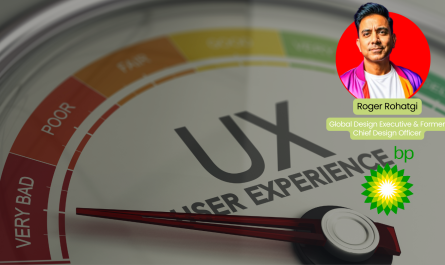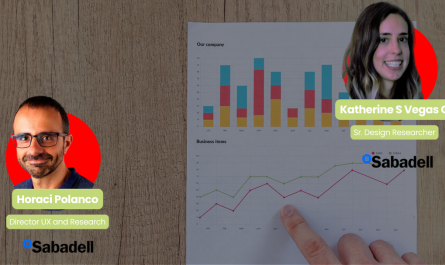Focus on Accessibility and Inclusivity – UX in the Public Sector

Sonja Wilczek talks about her focus on accessibility and inclusivity as Principal Researcher at DigitalService GmbH des Bundes. In our interview – and her presentation at UX360 2025 – Sonja highlights the difference between UX in the public sector and the private sector.
Sonja Wilczek has been working as a Principal User Researcher at DigitalService GmbH des Bundes since 2023. Previously, she led the user research discipline at TIER Mobility and worked as a user research consultant for user centricity as well as an embedded user researcher in various corporate contexts. She is passionate about the user-centered development of (digital) services and products that create real added value for humans.
UX360: What motivates you to join the UX360 conference, and what is the core message of your talk?
Sonja: After spending over a decade in the private sector, I moved into the public sector two years ago — and it required me to rethink how user research works. Many of the methods I used before are still relevant, but they need to be adapted to fit a different reality: stakeholder-involvement, inclusive thinking, and the challenge of designing services for everyone, not just a specific target group. At the same time, I don’t want to lose touch with the innovative approaches used in the private sector. That’s why I’m excited about UX360—to learn from others, exchange ideas, and find new ways to bridge these worlds.
My talk highlights why user-centricity is crucial for the success of digital projects in government—but also why it needs a slightly different approach than in the private sector. Unlike businesses, which use data-driven methods to optimize for competitive advantage, public institutions must ensure accessibility and inclusivity for all citizens, often without direct access to user data. I will share practical examples from justice projects, demonstrating how methodologies like shadowing, co-creation, and usability testing help bridge this gap. The goal is to show how governments can integrate user research effectively, making digital services more user-friendly and accessible for everyone.
UX360: How has this impacted your own work and your organisation?
Sonja: Moving into the public sector has felt like going back to the roots of user research. In recent years, especially since COVID-19, research in many industries has shifted towards remote methods, faster processes, and a more data-driven approach—sometimes at the cost of real human connection. But in government, meaningful user research relies on exactly that: deeply understanding people in their specific contexts.
In the private sector, research often focuses on optimizing products for specific user segments and business goals. In government, the challenge is different—we have to design services that work for everyone, including people with varying levels of digital literacy, accessibility needs, German skills or legal knowledge. This shift has pushed me to rethink how we conduct research, adapt methods, and find new ways to gather user insights despite legal and data constraints.
For my organization: User centricity was already deeply rooted in our values before I started as the first User Researcher at DigitalService. But the majority of us came from the private sector. So we had to learn together how to approach the major challenge of user-centricity in the public sector. We’ve worked on making research more collaborative, involving different stakeholders—like courts, legal professionals, and civil society—to compensate for challenges like limited direct user feedback.
We’ve also explored ways to bring in more innovative methods from the private sector, adapting them to work in a public service context, e.g. the Jobs-To-Be-Done-Framework for structuring discoveries, iterative usability testing and the North Star Metric Framework to define success metrics, observe user behaviour and analyze user satisfaction continuously.
Overall, this shift has strengthened the role of user research in our projects. It’s not just about digitizing forms —it’s about making public services more accessible, understandable, and user-friendly for all citizens.
UX360: How has UX as a practice evolved in the last couple of years, and how would you like to see it evolve in the next few?
Sonja: Over the past few years, the work as a User Researcher has changed a lot. With the shift to remote work, research has become faster, more digital, and heavily data-driven. Remote testing and automated analytics have made it more scalable, but in some cases, they’ve also led to a disconnect from real users. Instead of deeply understanding people and their needs, it has sometimes been used more for optimizing engagement and conversion rates.
At the same time, there’s been a stronger focus on ethics in user research, and inclusivity — especially in public services. More organizations are recognizing that it isn’t just about making interfaces better; it’s about creating fair and human-centered experiences that truly serve people – citizens, administrative staff and companies.
Going forward, I’d love to see User Research strike a balance between going back to its roots and embracing innovative methods. Spending more time with real users, doing field research, and understanding their everyday realities is essential—especially in government services, where accessibility and inclusivity need to be at the core from the start. At the same time, we shouldn’t ignore the potential of new, innovative approaches.
There’s a huge opportunity to thoughtfully bring private-sector methodologies into public services while adapting them to fit the context. AI and automation, for example, can help streamline research processes, but they should always be combined with deep qualitative insights to ensure services remain human-centered. Ultimately, I hope User Centred Design continues to evolve in a way that blends efficiency with empathy—leveraging both foundational research principles and new technologies to create digital services that are not just functional but truly meaningful.
UX360: Given this evolution, what are two expected and two less obvious skills UXers should possess, and why?
Sonja:
Two Expected Skills
Inclusive Research
Researching for inclusivity should be a fundamental skill for now. It’s no longer enough to think about usability in a general sense. We need to consider people with diverse needs from the start—whether for people with disabilities, different literacy levels, German skills or people who don’t have access to high-end devices. Ensuring digital services are truly inclusive is vital.
Stakeholder Collaboration
User Researcher and Designer need to become experts in navigating conversations with different stakeholders and levels. Being able to align different perspectives and bring people together around user needs is a key skill, especially in the public sector, where collaboration is critical to making services work for everyone. For this we have the support of transformation managers and are collaborating closely with them.
Two Less Obvious Skills
Adapting Methods to Context: Research methods aren’t one-size-fits-all, especially when working within complex environments like public services. User Researcher and Designers need to be creative and flexible, adapting their research techniques to fit constraints—whether that’s working with proxy users, using observational methods, or partnering with others who have direct access to users. It’s about finding ways to keep the user at the center, even when things aren’t perfect.
Balancing patience with high efficiency: In the fast-paced world it’s crucial to balance patience with high efficiency. Projects in the public sector can move slowly due to bureaucracy and the need for consensus. However, we also need to keep things moving. High efficiency means leveraging tools like AI and automated processes to streamline repetitive tasks – like transcription, support with clustering, tagging – allowing us to focus on human-centered work. It’s about knowing when to persist and when to rely on automation to keep things on track, all while staying focused on delivering the best outcomes for users.
UX360: Apart from work, what can delegates at the event talk to you about? Do you have any particular personal interests, hobbies or extracurricular activities and engagements?
Sonja: Apart from work, I love spending time in nature with my family — whether it’s hiking, taking walks in the forest, or just enjoying the beauty of the outdoors. My next holiday is actually planned for Scandinavia. But I also enjoy the cultural side of Berlin—photography exhibitions, concerts, restaurants. I’m always on the lookout for good recommendations.
UX360: Sonja, thank you very much. We look forward to hearing more from you at UX360 Europe this May!
Hurry to secure your seat at the UX360 Research Summit 2025 and meet Sonja in person!
The ultimate gathering of UX research and design leaders is here—two days packed with the latest industry insights, cutting-edge methodologies, and next-level inspiration.
This year, the summit features 30+ industry leaders from global powerhouses such as Google, Roche, IKEA, Meta, Nestle, and many more.
Network with world-class UX professionals from around the globe. Whether you’re a researcher or designer, this event is a must-attend for anyone looking to stay ahead in the field. Last chance to register!










 by
by 


